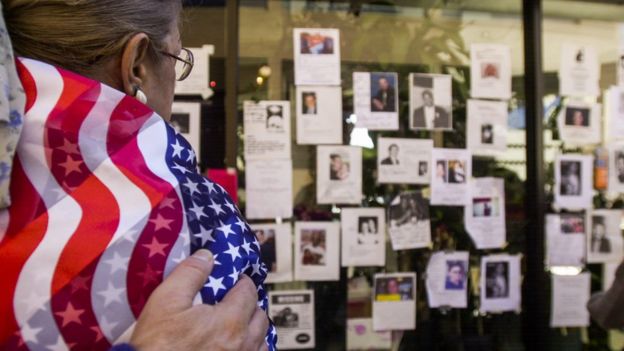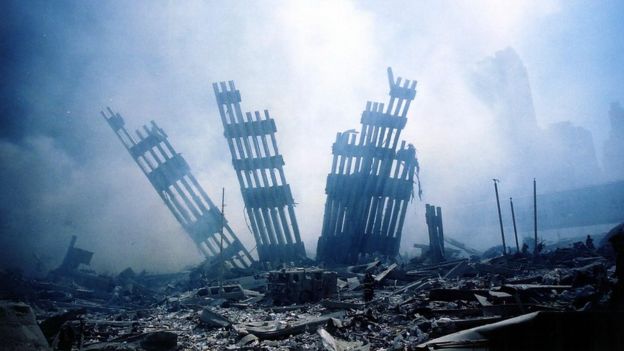Relatives of some of the victims of the September 11, 2011 attacks in the United States have for years accused the Saudi government of being responsible for those deaths.
The Saudi kingdom has always denied it. But an opinion issued on Wednesday rejected the Arab country’s request to end the long litigation over the alleged responsibility of Riyad in the attacks that caused the Twin Towers to collapse.
Manhattan District Judge George Daniels rejected the Saudi motion.
The plaintiffs, the relatives of those who died or were injured, argue that Saudi Arabia and several corporations in that country helped plan the attacks and must pay billions of dollars in damages to the victims.
Riyad asked the courts in 2015 to dismiss all the claims against him, arguing that there was no evidence of the victims’ allegations.
Copyright of the EPA imageImage caption Some 3,000 people died in the 9/11 attacks.
But Judge Daniels ruled that the allegations of the relatives of the victims and of those who were injured “articulate in an adjusted manner a reasonable basis for this court to assume jurisdiction, under the Law of Justice Against Sponsors of Terrorism (JASTA), of petitions of the plaintiffs. “
Law of Justice
The Law of Justice Against Sponsors of Terrorism, to which the judge refers in his opinion, was approved by Congress in 2016 allowing legal proceedings to be conducted against foreign States and their officials suspected of supporting terrorist activities even if they have previously been rejected in a court.
The law allowed survivors and relatives of victims of terrorist attacks to sue foreign governments.
After the attacks on September 11, 2011 in the United States, in which some 3,000 people died and thousands were injured, many of the families of the victims sued the Saudi government and several corporations of that country when it was announced that 15 of the 19 attackers or conspirators were Saudi.
Relatives and victims had tried to sue members of the Saudi royal family, banks and organizations they claimed were responsible for helping to plan the attacks.
The plaintiffs argue that Saudi Arabia “has responsibility in the terrorist attacks of September 11 because its agents and employees directly and knowingly helped the kidnappers and conspirators to carry out the attacks.”
Copyright of the GETTY IMAGES imageImage caption The ruins of the Twin Towers in New York, after the attack of September 11, 2011.
The relatives’ demands, however, had not been able to advance in part due to a 1976 law granting immunity to foreign governments.
Judge Daniel’s ruling includes lawsuits from family members of the dead, some 25,000 people who suffered injuries, and businesses and insurers.
Daniels said the plaintiffs may now try to prove that Saudi Arabia is responsible for the alleged activities of Fahad al Thumairy, an imam of the King Fahad mosque in Culver City, California, and Omar al Bayoumi, who is said to be an intelligence officer. .
Copyright of the GETTY IMAGESImage caption Barack Obama had vetoed the law that allowed relatives of the victims of the attacks of September 11, 2001 to sue the government of Saudi Arabia.
“Let the whole truth arise”
James Kreindler, a lawyer for several of the plaintiffs, said he was “delighted” that the case could now proceed.
“We have been pushing to move forward with this case and carry out the procedures with the Kingdom of Saudi Arabia so that the whole truth emerges and expose the Saudi role in the attacks of September 11,” the lawyer told Reuters.
The judge, however, dismissed the claims against two Saudi banks and a Saudi construction company for allegedly providing material support to al Qaeda and its leader Osama bin Laden to carry out the attacks, and indicated that they lacked jurisdiction.
Riyad has harshly criticized the JASTA law since it was approved in September 2016, arguing that it erodes the principle of national sovereignty .
The kingdom has even threatened to withdraw investments from the US economy and has been pressing for an amendment to the legislation that it says is “a serious danger to the international system.”
The post Why a judge in the United States decided that Saudi Arabia must face the demands presented by the attacks of September 11, 2001 appeared first on Rava.
from Rava https://ift.tt/2GlAsY6



0 comments:
Post a Comment